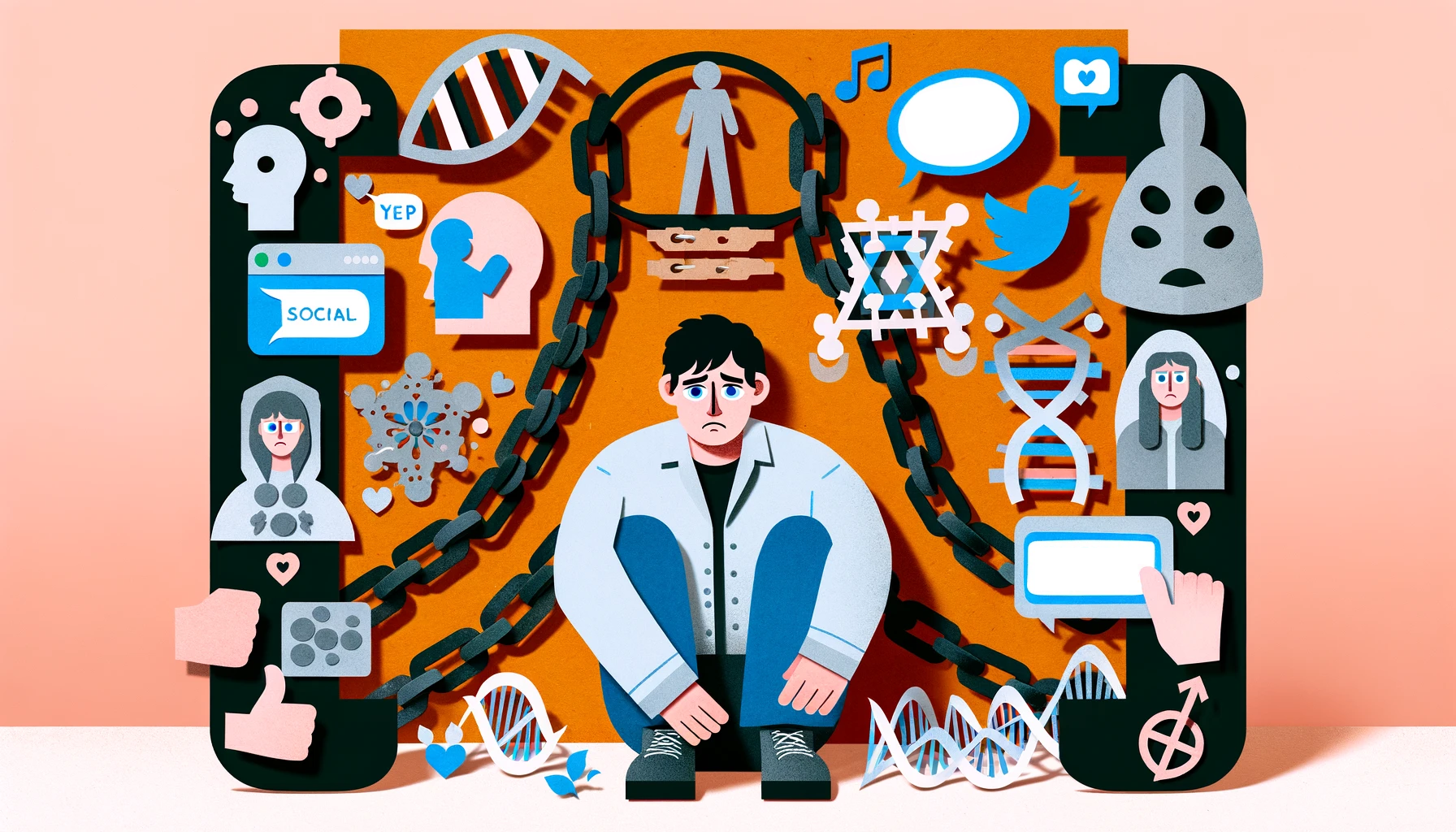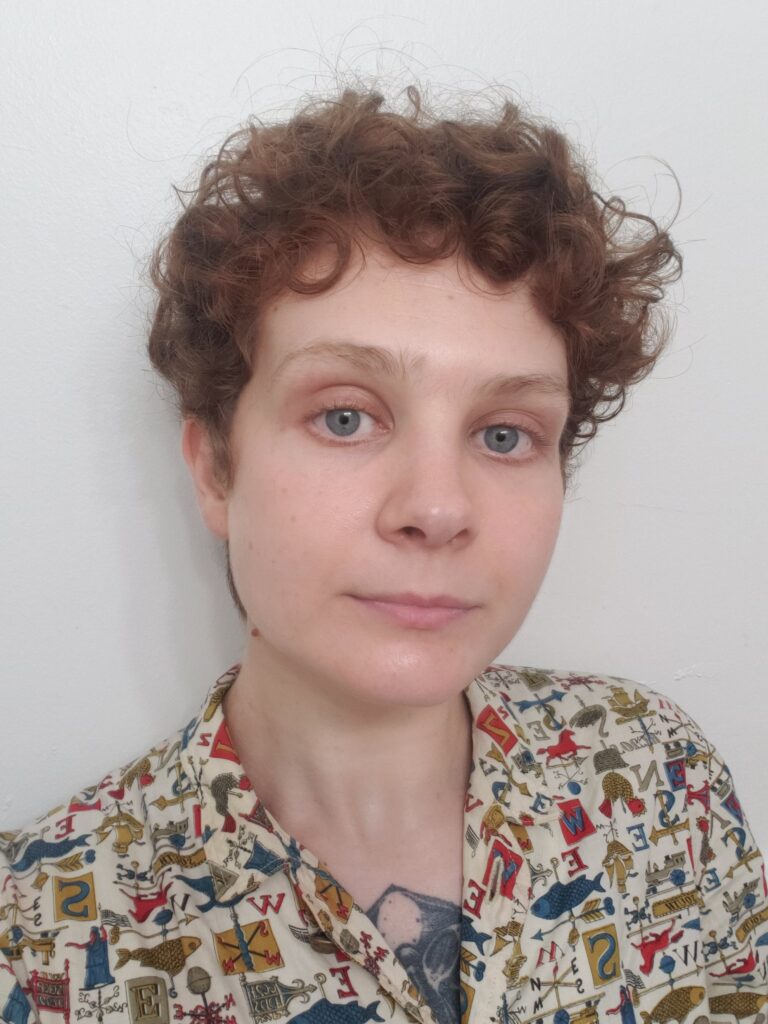
A critical perspective on “incel logic”
By Elia Goffi
Online discourse has been increasingly buzzing with the idea of an epidemic of men’s loneliness. Toward the extreme end are incels, whose reactionary “manosphere” is waging an online crusade against feminism that spills over into incidents of terrorism (Valenti, 2018). Much digital ink has been spilled over this phenomenon and the hate and violence it can breed. These articles and posts are often either alarmist or ridiculing towards incels, though some have taken a more moderate approach sympathizing with men’s plight of loneliness (Gordon Smith, 2023; Rice-Nguyen, 2022). However, both lines of discourse tend to focus on recent issues facing men in the past few years or decades. A closer examination reveals a much deeper phenomenon of men’s discontentment in their romantic and sexual prospects and more effective tools for combatting the resulting hate and suffering.
The path to “incel logic” contains two key links: genetics →involuntary celibacy→ unhappiness. Though these points are by no means a complete picture of the rhetoric in these communities, they will be used to demonstrate the power of a critical lens in deconstructing it. A critical stance refers to a set of approaches centered around uncovering and challenging dominant power structures. This includes a range of tools that will be drawn upon here: careful examination of discourse and ideas of representation, self-reflection, and research as a potential vehicle of change (Lafrance & Wigginton, 2019).
The first link, genetics →involuntary celibacy, is basically an essentialist argument, or one which posits that immutable, biological makeup is the most influential factor in attractiveness (Vallerga and Zurbriggen, 2022). In this case, incel rhetoric focuses heavily on how genetic makeup determines how attractive someone is. For example, incel forums fixate on details of bone structure such as chin or wrist size as evidence that no amount of “playing the game” (e.g., hygiene, social skills, etc.) will fix. This biological stance is defended fiercely, as without it these men would be left at fault for their romantic failures. Suggestions to improve attractiveness through grooming, getting a hobby, etc. are resisted as insulting and further proof of how others fail to understand their plight.
When a critical lens is applied, the distortion in this first link is quickly exposed by the incel community itself. Another key topic in these forums is detailing what are seen as the effects of feminism on women. Interestingly, biological/essentialist ideas of women (e.g., as inherently submissive, delicate, etc.) do not take center stage in incel rhetoric. Women are ranked according to their “natural” attractiveness, but this discourse is focused on how feminism has fundamentally spoiled women into dominating men (while remaining sexually submissive to a select few) and becoming bitchy, opinionated, and provocative to others (Institute for Strategic Dialogue, 2022). The result is that biological/essentialist arguments keep incel men hopelessly stuck as their lot in life is set in stone, while women are apparently so subject to social forces that they can be spoiled to their core by societal shifts of the last few decades. They reject advice to seek out hobbies and friends while spewing venom at women who have apparently been ruined by social influences (e.g., feminist literature in college, blue hair dye) (Institute for Strategic Dialogue, 2022). This contradiction seems either blatantly self-defeating or maliciously employed by leaders in incel communities to leave these men with no way out.
The second link at work here, involuntary celibacy→ unhappiness, assumes this deterministic worldview and then asserts that because one has no real sexual and/or romantic prospects one will remain perpetually unhappy. This link seems tenuous outside of its historical context, as it is often presented by opposing groups, but it has deep roots with implications across genders. Critiques of these communities focus on attacking notions of how the game of dating is rigged but pay little attention to how playing this game is compulsory.
Compulsory heterosexuality is the idea that people are assumed to be heterosexual and that society demands they act as such (Rich, 1980). It has been an idea within feminist thinking for decades and is increasingly found in online left-leaning discourse, particularly among queer communities where the hetero portion is emphasized. However, the mandate at an even deeper level is to participate in sexuality. Evidence-based, material differences in quality of life aside, obtaining a romantic partner is held as an almost mythic precursor to a happy and fulfilling existence (Gordon Smith, 2023; Vallerga and Zurbriggen, 2022). Especially given the relational poverty men perceive in their other close relationships (Vallerga and Zurbriggen, 2022), it is no wonder that this link between lack of romantic success and eternal misery is so entrenched. Men subscribing to incel rhetoric are made to feel as if they are left with nothing and no tools to change their lot in life.
This is by no means an exhaustive exploration of tenets held by this community, and there are many other aspects that warrant particular attention. Race and class intersect with the gendered issues above– for example, there are groups of men of color within incel communities with unique concerns (Gheorghe, 2024). This article also does not contend directly with some of the real harms that these communities have sheltered, if not produced, in the form of suicide and physical violence (Rice-Nguyen, 2022).
It is precisely because the stakes can be so high that discourse on incel communities should be diligent to go beyond positions of mocking or tentative sympathy and work to challenge the structures propping them up, and research can potentially expose the ways in which these men are being shaped by their environment. Though many aspects of their situation may not be ideal and even unchangeable, a critical lens may be better able to emphasize the role of power structures in a way that shows how incel communities are being undermined by their own rhetoric. Of course, presenting this logic as distorted will not be effective if the context, history, and unique norms of these communities are not accounted for. Critical theory has the basic tools to examine the logic at work in these forums, and these principles should be carried forward into research and interventions.
References
Gheorghe, R. M. (2024). “Just Be White (JBW)”: Incels, race and the violence of whiteness. Affilia, 39(1), 59-77. https://doi.org/10.1177/08861099221144275
Gordon Smith, E. (2023). I’m technically an incel but not a misogynist. Why aren’t women attracted to me? The Guardian. https://www.theguardian.com/lifeandstyle/2023/feb/10/im-technically-an-incel-but-not-a-misogynist-why-arent-women-attracted-to-me
Vallerga, M., Zurbriggen, E.L. (2022). Hegemonic masculinities in the ‘Manosphere’: A thematic analysis of beliefs about men and women on The Red Pill and Incel. Analysis of social issues and public policy, 22(2), 602-625.
Institute for Strategic Dialogue (2022). The ‘Manosphere’. https://www.isdglobal.org/explainers/the-manosphere-explainer/
Lafrance, M. N., & Wigginton, B. (2019). Doing critical feminist research: A Feminism & Psychology reader. Feminism & Psychology, 29(4), 534-552.
Rice-Nguyen, E. (2022). How masculinity twists the minds of incels. Pitt News. https://pittnews.com/article/177904/opinions/opinion-how-masculinity-twists-the-minds-of-incels/
Rich, A. (2002). Compulsory heterosexuality and lesbian existence. Culture, society and sexuality (pp. 199-225). Routledge.
Valenti, J. (2018). When misogynists become terrorists. The New York Times. https://www.nytimes.com/2018/04/26/opinion/when-misogynists-become-terrorists.html

Elia is a Clinical Psychology PhD student at The New School for Social Research. She serves as lab manager for the Center for Attachment Research and as editor for the New School Psychology Bulletin. Her research lies at the intersection of sexuality, technology, and body representation: the thoughts, feelings, and images we have surrounding our bodies. This intersection has recently led her to collaborate with the Sex Tech lab, where she hopes to incorporate a critical perspective and amplify the voices of underrepresented and misrepresented groups through her work.